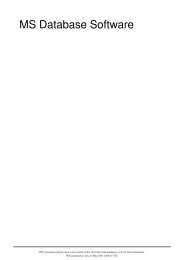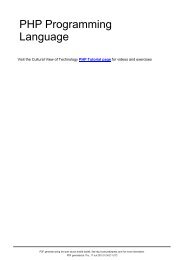Contents - Cultural View
Contents - Cultural View
Contents - Cultural View
You also want an ePaper? Increase the reach of your titles
YUMPU automatically turns print PDFs into web optimized ePapers that Google loves.
Comparison of the Java and .NET platforms 95<br />
the only officially supported platform is Windows. [14] A community port to Linux of the 1.0 shared source .NET<br />
virtual machine is also available. [15] In March 2003, O'Reilly Media published a book about Microsoft's shared<br />
source .NET runtime. [16]<br />
Traditional computer applications<br />
Desktop applications<br />
Although Java's AWT (Abstract Windowing Toolkit) and Swing libraries are not shy of features, Java has struggled<br />
to establish a foothold in the desktop market. Sun Microsystems has also been slow, in the eyes of some, to promote<br />
Java to developers and end users alike in a way which makes it an appealing choice for desktop software. Even<br />
technologies such as Java Web Start, which have few parallels within rival languages and platforms, have barely<br />
been promoted.<br />
The release of Java version 6.0 in December 11, 2006, saw a renewed focus on the desktop market with an extensive<br />
set of new tools for closer integration with the desktop. At the 2007 JavaOne conference Sun made further desktop<br />
related announcements, including a new language aimed at taking on Adobe Flash (JavaFX), a new lightweight way<br />
of downloading the JRE which sees the initial footprint reduced to under 2Mb, and a renewed focus on multimedia<br />
libraries.<br />
An alternative to AWT and Swing is the Standard Widget Toolkit (SWT), which was originally developed by IBM<br />
and now maintained by the Eclipse Foundation. It attempts to achieve improved performance and visualization of<br />
Java desktop applications by relying on underlying native libraries where possible.<br />
.NET is becoming more common in open source and free software systems due to its inclusion [17] by the GNOME<br />
desktop environment using the Mono framework.<br />
Server applications<br />
This is probably the arena in which the two platforms are closest to being considered rivals. Java, through its Java<br />
EE (a.k.a. Java Platform Enterprise Edition) platform, and .NET through ASP.NET, compete to create web-based<br />
dynamic content and applications.<br />
Both platforms are well used and supported in this market, with a bevy of tools and supporting products available for<br />
Java EE and .NET. And both have high profile backers. For example, for Java: Oracle included direct support for<br />
Java into its database, while Google has used Java to power tools like Gmail. [18]<br />
Some of Sun's current Java-related license agreements for Java EE define aspects of the Java platform as a trade<br />
secret, [19] and prohibit the end user from contributing to a third-party Java environment. Specifically, at least one<br />
current license for a Sun Java EE development package contains the following terms: "You may make a single<br />
archival copy of Software, but otherwise may not copy, modify, or distribute Software." — "Unless enforcement is<br />
prohibited by applicable law, you may not decompile, or reverse engineer Software." — "You may not publish or<br />
provide the results of any benchmark or comparison tests run on Software to any third party without the prior<br />
written consent of Sun." — "Software is confidential and copyrighted." [19] However, while Sun's software is subject<br />
to the above license terms, Sun's Java EE API reference has been implemented under an open source license by the<br />
JBoss and JOnAS projects.<br />
Microsoft's implementation of ASP.NET is not part of the standardized CLI, and while Microsoft's runtime<br />
environment and development tools are not subject to comparable secrecy agreements to Java EE, the official<br />
Microsoft tools are not open source or free software, and require Windows servers. However, a cross-platform free<br />
software ASP.NET 2.0 implementation is part of the Mono project (minus webparts and Web Services<br />
Enhancements). [20]










